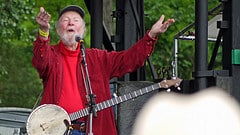Most of my life I have assumed that the kind of songs I sing would not normally get played on the airwaves. I pointed to examples like Woody Guthrie’s song, “This Land Is Your Land” to show that they don’t have to get played on the airwaves. If it’s a real good song, it will get spread around anyway.
But in 1967 I wrote what I thought was a real good song, and I knew there wasn’t time for it to get around the country. People were being killed every day in Vietnam. I had a recording contract with Columbia Records at that time, and my friends there even agreed to put out a record of it; but the sales department just laughed at us both. The records stayed on the shelves and weren’t even sent to the stores.
But two young comedians had a successful television show, and they asked their bosses if I could be a guest on their show. The Smothers Brothers were turned down by CBS TV at first, but finally they said O.K. I flew out to California and sang some songs that had been sung by American soldiers in four different wars-the American Revolution, the Civil War, World War I, and lastly this song, “Waist Deep in the Big Muddy.” It was a story song, kind of an allegory, describing a bunch of soldiers training during World War II and the captain tells them to ford a muddy river. But as it gets deeper the sergeant urges they turn around. The Captain says, “Don’t be a Nervous Nelly. Follow me.” But the Captain is drowned and they find his body stuck in the old quicksand. And the last verse says, “Every time I read the paper, those old feelings come on/We are waist deep in the Big Muddy and the big fool says to push on.”
Son of a gun, when the show was supposed to be played on the air, the song had been scissored out of the tape by the higher-ups at CBS Television. Now the Smothers Brothers did a clever thing. They took their argument to the newspapers and they got lots of free publicity. They said, “CBS censors our best jokes, they censored Seeger’s best song. It ain’t fair.” Finally in the month of January, 1968, the word came from New York, “O.K., O.K., you can sing the song if you want.”
On 48 hours’ notice I flew out to California, taped the song, and this time 7 million people saw it and even got some extra newspaper publicity. Only one station, I think, in Detroit, scissored the last verse out of the tape.
Did the song do any good? No one can prove a damned thing. It took tens of millions of people speaking out, before the Vietnam War was over. A defeat for the Pentagon, but a victory for the American people.
Of course, a song is not a speech, you know. It reflects new meanings as one’s life’s experiences shine new light upon it. (This song does not mention Vietnam or President Johnson by name.) Often a song will reappear several different times in history or in one’s life as there seems to be an appropriate time for it. Who knows. Here are the complete words of the song (I’m supposed to tell people that it’s copyright 1967 by T.R.O.):
It was back in 1941.
I was a member of a good platoon.
We were on maneuvers in Lou’siana one night
By the light of the moon.
The Captain told us to ford a river.
That’s how it all begun.
We were knee deep in the Big Muddy,
And the big fool said to push on.
The Sergeant said, “Sir, are you sure
This is the best way back to the base?”
“Sergeant, go on, I’ve forded this river
About a mile above this place.
It’ll be a little soggy, but just keep sloggin’.
We’ll soon be on dry ground.”
We were waist deep in the Big Muddy,
And the big fool said to push on.
The Sergeant said, “Sir, with all this equipment,
No man will be able to swim.”
“Sergeant, don’t be a Nervous Nelly,”
The Captain said to him.
“All we need is a little determination.
Men, follow me. I’ll lead on.”
We were neck deep in the Big Muddy,
And the big fool said to push on.
All at once the moon clouded over.
We heard a gurglin’ cry.
A few seconds later the Captain’s helmet
Was all that floated by.
The Sergeant said, “Turn around, men.
I’m in charge from now on.”
And we just made it out of the Big Muddy
With the Captain dead and gone.
We stripped and dived and found his body
Stuck in the old quicksand.
I guess he didn’t know that the water was deeper
Then the place he’d once before been.
Another stream had joined the Big Muddy
About a half mile from where we’d gone.
We were lucky to escape from the Big Muddy
When the big fool said to push on.
Now I’m not going to point any moral —
I’ll leave that for yourself.
Maybe you’re still walking, you’re still talking,
You’d like to keep your health.
But every time I read the papers, that old feeling comes on,
We’re waist deep in the Big Muddy
And the big fool says to push on.
Waist deep in the Big Muddy,
The big fool says to push on.
Waist deep in the Big Muddy,
The big fool says to push on.
Waist deep, neck deep,
Soon even a tall man will be over his head.
We’re waist deep in the Big Muddy,
And the big fool says to push on.
From (From GIVE PEACE A CHANCE, A 1983 Exhibit at the Peace Museum in Chicago) PeteSeeger.net.
Flickr/kooky kooky

